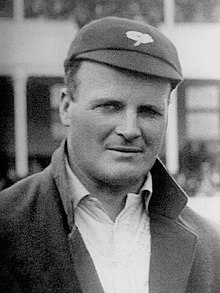 Roy Kilner in 1925 | ||||||||||||||||||||||||||||||||||||||||
| Personal information | ||||||||||||||||||||||||||||||||||||||||
|---|---|---|---|---|---|---|---|---|---|---|---|---|---|---|---|---|---|---|---|---|---|---|---|---|---|---|---|---|---|---|---|---|---|---|---|---|---|---|---|---|
| Full name | Roy Kilner | |||||||||||||||||||||||||||||||||||||||
| Born | 17 October 1890 Wombwell, Yorkshire, England | |||||||||||||||||||||||||||||||||||||||
| Died | 5 April 1928 (aged 37) Kendray, Barnsley, Yorkshire, England | |||||||||||||||||||||||||||||||||||||||
| Batting | Left-handed | |||||||||||||||||||||||||||||||||||||||
| Bowling | Left-arm orthodox spin / Left-arm unorthodox spin | |||||||||||||||||||||||||||||||||||||||
| International information | ||||||||||||||||||||||||||||||||||||||||
| National side | ||||||||||||||||||||||||||||||||||||||||
| Test debut (cap 214) | 14 June 1924 v South Africa | |||||||||||||||||||||||||||||||||||||||
| Last Test | 27 July 1926 v Australia | |||||||||||||||||||||||||||||||||||||||
| Domestic team information | ||||||||||||||||||||||||||||||||||||||||
| Years | Team | |||||||||||||||||||||||||||||||||||||||
| 1911–1927 | Yorkshire | |||||||||||||||||||||||||||||||||||||||
| Career statistics | ||||||||||||||||||||||||||||||||||||||||
| ||||||||||||||||||||||||||||||||||||||||
Source: CricketArchive, 23 April 2010 | ||||||||||||||||||||||||||||||||||||||||
Roy Kilner (17 October 1890 – 5 April 1928) was an English professional cricketer who played nine Test matches for England between 1924 and 1926. An all-rounder, he played for Yorkshire County Cricket Club between 1911 and 1927. In all first-class matches, he scored 14,707 runs at an average of 30.01 and took 1,003 wickets at an average of 18.45. Kilner scored 1,000 runs in a season ten times and took 100 wickets in a season five times. On four occasions, he completed the double: scoring 1,000 runs and taking 100 wickets in the same season, recognised as a sign of a quality all-rounder.
Kilner first played for Yorkshire as a batsman before the First World War, establishing a regular place in the side. After being wounded in the war, he returned in 1919 to a Yorkshire side which was short of bowlers. As a result, Kilner began to practise his bowling to the point where he became highly regarded as a slow left-arm bowler. His aggressive batting and warm personality made him a popular player with both cricketers and spectators. His form brought selection by England in 1924 and a visit to Australia for the Ashes tour of 1924–25. Although the second most successful bowler of the tour, his bowling subsequently declined in effectiveness, and did not trouble batsmen on good pitches. He was selected during the 1926 Ashes but dropped for the final Test. Kilner went on several coaching trips to India during English winters, and on one of these, in 1928, he contracted an illness; on his return to England, he died aged 37. His funeral was attended by over 100,000 people and there was widespread sadness at his death.